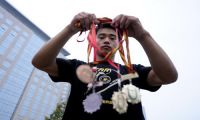Zhang Shangwu
Zhang Shangwu (Chinese: 张尚武) is a retired Chinese gymnast who won two gold medals at the World University championships in 2001. Due to his deteriorating financial situation after his retirement due to injuries, Zhang was incarcerated for four years for committing theft in 2007, and was later caught begging for money in Beijing after his release from jail. Zhang’s plight has caused controversy in the Chinese sports world for the poor treatment of retired athletes.
Born in 1983 in Hebei Province, Zhang rose to prominence when he was selected for the Chinese national gymnastics team at age 12. However, in 2002, the champion broke the tendon of his left foot, making him unable to qualify for the 2004 Olympics. He subsequently receded from the spotlight, retiring from the sport in 2005.
In 2007, Zhang was caught stealing and was sentenced to four years in prison. He was jobless after being released in April, 2011. A few months later, in July, Zhang was found performing gymnastic stunts for money near the Wangfujing shopping district in Beijing. He was recognized by a fan and his embarrassing plight was widely circulated on the Internet.
Zhang’s story drew a lot of attention from the local media. Zhang told his story to reporters in many subsequent interviews. "Nobody trusted me, because I got a blemish in my life. Nobody was willing to help me," Zhang said to one reporter.
Following the blitz of media coverage, Zhang’s live has improved. He received temporary housing assistance from a Beijing newspaper. His former teammates and other sports figures and celebrities have also helped provide him with job opportunities. Most notably, recycling magnate and philanthropist Chen Guangbiao invited him to be his personal fitness trainer.
Despite the assistance Zhang has received, his story has caused much controversy over China’s athletic program. Critics argue athletes are not provided with ample education or job skills, despite their heavy athletic training regimen. Zhang’s bleak situation could have been prevented, they argue, if programs better prepare athletes to face the real world after retirement.
